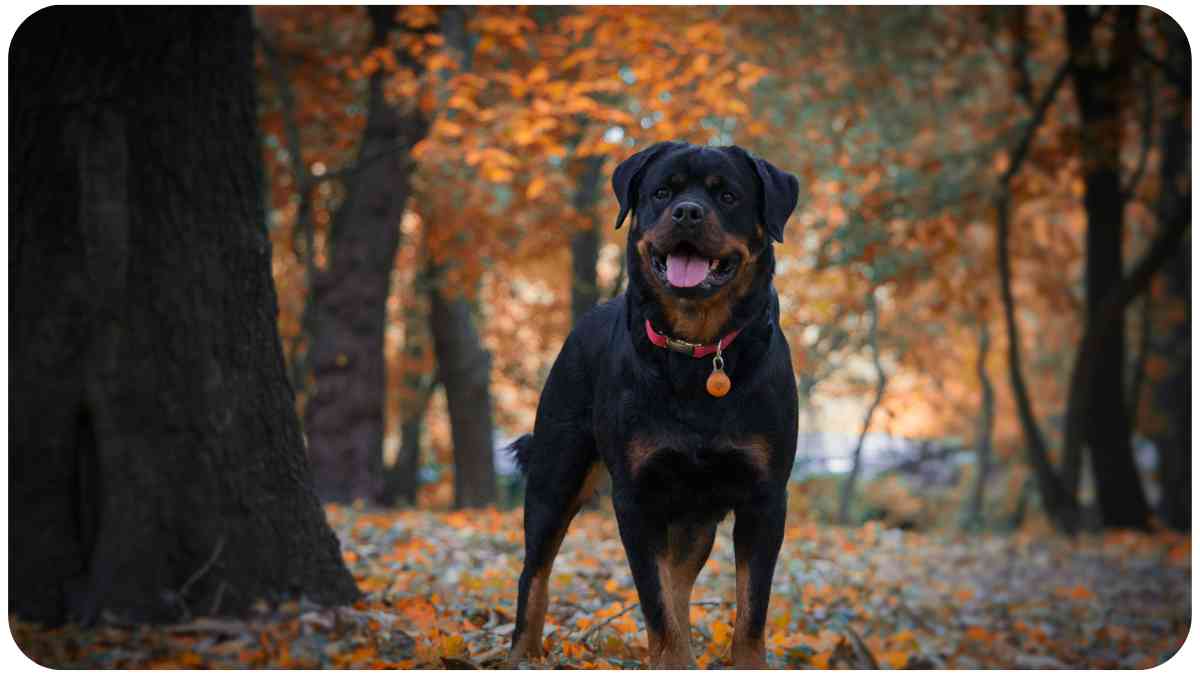Welcome to our guide on training your Rottweiler effectively! Rottweilers are magnificent dogs known for their strength, loyalty, and intelligence. However, like any other breed, they require proper training and socialization to become well-behaved companions. In this article, we’ll provide you with essential tips and techniques to train your Rottweiler successfully.
| Takeaways |
|---|
| 1. Understanding your Rottweiler’s traits |
| 2. Setting clear training goals |
| 3. Establishing leadership and consistency |
| 4. Utilizing positive reinforcement techniques |
| 5. Prioritizing socialization and exposure |
| 6. Providing ample exercise and mental stimulation |
| 7. Addressing behavioral issues with patience and understanding |
| 8. Ensuring proper health and nutrition |
| 9. Celebrating small victories in training |
| 10. Dealing with setbacks positively |
2. Understanding Your Rottweiler

Before diving into training, it’s crucial to understand the characteristics and behavior of Rottweilers. Here’s a quick overview:
Understanding the temperament of Rottweilers is crucial for effective training. By learning about their behavior, owners can tailor training methods to suit their Rottie’s personality, leading to better results and a stronger bond.
Characteristics of Rottweilers
| Characteristic | Description |
|---|---|
| Size | Large and muscular |
| Coat | Short, dense, and black with distinct tan markings |
| Strength | Powerful jaws and body |
| Intelligence | Highly intelligent and eager to learn |
Temperament and Behavior
| Behavior | Description |
|---|---|
| Loyalty | Deeply loyal to their family members |
| Confidence | Confident and assertive demeanor |
| Protectiveness | Naturally protective instincts towards their territory and loved ones |
| Trainability | Respond well to consistent and positive training techniques |
Understanding these traits will help you tailor your training methods to suit your Rottweiler’s needs.
Rottweilers possess qualities that make them ideal family pets. From their loyalty and protectiveness to their gentle nature with children, these dogs enrich family life in numerous ways, earning their reputation as beloved companions.
3. Setting Training Goals
Once you understand your Rottweiler’s characteristics, it’s time to set training goals. Determine what behaviors you want to reinforce and what commands you want your dog to learn.
Basic Obedience
| Training Goal | Description |
|---|---|
| Sit | Teach your Rottweiler to sit on command |
| Stay | Train your dog to stay in place until released |
| Come | Teach your Rottweiler to come when called |
| Loose Leash Walking | Teach your dog to walk calmly on a leash without pulling |
Advanced Commands
| Training Goal | Description |
|---|---|
| Down | Train your Rottweiler to lie down on command |
| Leave It | Teach your dog to leave objects or distractions when commanded |
| Heel | Train your dog to walk beside you in a controlled manner |
| Place | Teach your Rottweiler to go to a designated spot and stay there |
Setting clear goals will keep your training sessions focused and effective.
4. Establishing Leadership
Rottweilers are pack animals and respond well to confident and consistent leadership. Here’s how to establish yourself as the leader:
Building Trust and Respect
| Technique | Description |
|---|---|
| Consistency | Be consistent in your commands and expectations |
| Positive Reinforcement | Use rewards and praise to reinforce desired behaviors |
| Clear Communication | Use clear and firm commands to convey your expectations |
| Bonding Activities | Engage in activities that strengthen the bond between you and your Rottweiler |
Consistency in Training
| Tip | Description |
|---|---|
| Regular Training Schedule | Stick to a consistent training schedule to establish routine and reinforce learning |
| Family Involvement | Involve your family members in training to ensure consistency across all interactions |
| Avoid Mixed Signals | Avoid sending conflicting messages or allowing behaviors that you don’t want to reinforce |
| Patience and Persistence | Stay patient and persistent, as training takes time and effort |
Consistency and clear leadership will help your Rottweiler understand their role in the household.
Raising a Rottweiler puppy requires patience, knowledge, and dedication. This comprehensive guide offers invaluable advice on nurturing a Rottie pup, covering everything from socialization and training to health care and nutrition, ensuring a happy and well-adjusted companion.
5. Positive Reinforcement Techniques

Rottweilers respond well to positive reinforcement techniques that focus on rewarding desired behaviors.
Reward-Based Training
| Technique | Description |
|---|---|
| Treats | Use small, tasty treats as rewards for obeying commands |
| Verbal Praise | Shower your Rottweiler with praise and encouragement when they perform desired behaviors |
| Toys | Use toys or playtime as a reward for good behavior |
| Consistency | Be consistent in rewarding behaviors to reinforce them effectively |
Clicker Training
| Technique | Description |
|---|---|
| Clicker Device | Use a clicker device to mark desired behaviors |
| Timing | Click at the precise moment your Rottweiler performs the desired behavior |
| Pairing with Treats | Pair the click sound with treats to create positive associations |
| Gradual Training | Gradually fade out the clicker as your Rottweiler learns to associate behaviors with rewards |
Positive reinforcement creates a positive learning environment and strengthens the bond between you and your Rottweiler.
6. Socialization and Exposure
Socialization is crucial for Rottweilers to become well-rounded and confident dogs. Start socialization early and expose your Rottweiler to various people, animals, and environments.
Early Socialization
| Tip | Description |
|---|---|
| Puppy Classes | Enroll your Rottweiler in puppy classes to meet other dogs and people in a controlled setting |
| Playdates | Arrange playdates with other vaccinated and friendly dogs |
| Exposure to People | Introduce your Rottweiler to different types of people, including children, adults, and seniors |
| Positive Experiences | Ensure that socialization experiences are positive and rewarding for your Rottweiler |
Exposure to Various Environments
| Tip | Description |
|---|---|
| Walks in Different Places | Take your Rottweiler for walks in various environments such as parks, streets, and trails |
| Car Rides | Introduce your dog to car rides gradually and make them a positive experience |
| Visits to New Places | Bring your Rottweiler to new places such as pet-friendly stores, cafes, and outdoor events |
| Desensitization | Gradually expose your dog to stimuli they may encounter in everyday life, such as loud noises or crowds |
Socialization helps prevent behavioral problems and ensures that your Rottweiler is comfortable in different situations.
The loyalty and protective instincts of Rottweilers are legendary. By exploring these traits, owners gain insight into their Rottie’s behavior and can channel these qualities positively, fostering a strong bond and a sense of security.
7. Exercise and Mental Stimulation
Rottweilers are active dogs that require plenty of exercise and mental stimulation to thrive.
Physical Exercise Needs
| Tip | Description |
|---|---|
| Regular Walks | Take your Rottweiler for daily walks to fulfill their exercise needs |
| Active Playtime | Engage in active play sessions such as fetch, tug-of-war, or agility training |
| Running or Jogging | Rottweilers enjoy running alongside their owners during jogs or runs |
| Outdoor Activities | Take your dog hiking, swimming, or exploring new outdoor environments |
Mental Stimulation Activities
| Tip | Description |
|---|---|
| Puzzle Toys | Provide puzzle toys or interactive feeders to stimulate your Rottweiler’s mind |
| Training Sessions | Incorporate training sessions into your daily routine to challenge your dog mentally |
| Nose Work | Engage your Rottweiler’s sense of smell by hiding treats or toys for them to find |
| Obedience Competitions | Participate in obedience competitions or activities to keep your Rottweiler mentally sharp |
A combination of physical exercise and mental stimulation will keep your Rottweiler happy and healthy.
8. Addressing Behavioral Issues
Despite their loyal and affectionate nature, Rottweilers may develop behavioral issues that require attention and training.
Aggression
| Issue | Description |
|---|---|
| Signs of Aggression | Recognize signs of aggression, such as growling, barking, or lunging towards people or animals |
| Professional Help | Seek guidance from a professional dog trainer or behaviorist if your Rottweiler displays aggressive behavior |
| Positive Reinforcement | Use positive reinforcement techniques to redirect aggressive behaviors towards positive ones |
| Controlled Exposure | Gradually expose your dog to triggers in a controlled environment to desensitize them |
Destructive Behavior
| Issue | Description |
|---|---|
| Causes of Destructive Behavior | Identify underlying causes of destructive behavior, such as boredom, anxiety, or lack of exercise |
| Environmental Enrichment | Provide plenty of toys, chew bones, and interactive activities to keep your Rottweiler mentally stimulated |
| Crating | Use a crate as a safe and secure space for your dog when unsupervised to prevent destructive behavior |
| Consistent Training | Consistently reinforce appropriate behavior and redirect your Rottweiler’s focus to acceptable activities |
Addressing behavioral issues requires patience, consistency, and understanding of your Rottweiler’s needs.
9. Health and Nutrition
A healthy diet and regular veterinary care are essential for your Rottweiler’s overall well-being.
Proper care is essential for maintaining the health and well-being of Rottweilers. This guide provides valuable tips on nutrition, exercise, and healthcare tailored to Rottie’s specific needs, ensuring a happy, active, and thriving canine companion.
Importance of Proper Diet
| Tip | Description |
|---|---|
| High-Quality Food | Choose a high-quality dog food formulated for large breeds like Rottweilers |
| Balanced Nutrition | Ensure that your Rottweiler’s diet includes a balance of protein, carbohydrates, fats, vitamins, and minerals |
| Portion Control | Monitor your dog’s food intake to prevent overfeeding and obesity |
| Fresh Water | Provide fresh and clean water for your Rottweiler at all times |
Regular Veterinary Checkups
| Tip | Description |
|---|---|
| Annual Exams | Schedule annual veterinary exams to monitor your Rottweiler’s health |
| Vaccinations | Keep up-to-date with vaccinations to protect your dog from preventable diseases |
| Parasite Prevention | Administer flea, tick, and heartworm preventatives as recommended by your veterinarian |
| Dental Care | Brush your Rottweiler’s teeth regularly and provide dental chews or treats for oral health |
Regular veterinary care and a nutritious diet are crucial for keeping your Rottweiler healthy and happy.
10. Patience and Persistence

Training a Rottweiler requires patience, persistence, and a positive attitude.
Celebrate Small Victories
| Tip | Description |
|---|---|
| Acknowledge Progress | Celebrate each milestone and improvement in your Rottweiler’s training |
| Positive Reinforcement | Use praise, treats, and affection to reinforce desired behaviors |
| Keep a Training Journal | Keep track of your training sessions and your dog’s progress to stay motivated |
| Focus on the Journey | Enjoy the training process and the bond you’re building with your Rottweiler along the way |
Dealing with Setbacks
| Tip | Description |
|---|---|
| Stay Calm and Patient | Remain calm and patient when faced with setbacks or challenges in training |
| Identify the Cause | Determine the underlying cause of the setback and adjust your training approach accordingly |
| Seek Support | Reach out to professional trainers or online communities for advice and support |
| Adjust Expectations | Be flexible and adjust your expectations based on your Rottweiler’s individual progress |
Remember, every dog learns at their own pace, so stay patient and persistent in your training efforts.
Conclusion
Training your Rottweiler can be a rewarding journey filled with love, laughter, and companionship. By understanding your dog’s needs, setting clear goals, and using positive reinforcement techniques, you can build a strong bond and ensure a well-behaved and happy Rottweiler for years to come. Stay patient, stay consistent, and enjoy the journey of training your beloved companion.
Further Reading
Here are some additional resources for further reading on Rottweiler training:
- RottweilerHQ Training Guide: Explore comprehensive training tips and techniques specifically tailored for Rottweilers.
- AKC: How to Train a Rottweiler: Learn expert advice on training your Rottweiler puppy effectively, provided by the American Kennel Club.
- US Service Animals: Rottweiler Training: Discover insights and strategies for training your Rottweiler from the perspective of service animal training experts.
FAQs
How do I potty train my Rottweiler puppy?
To potty train your Rottweiler puppy, establish a regular schedule for bathroom breaks, use positive reinforcement when they eliminate in the appropriate area, and supervise them closely indoors.
What is the best age to start training a Rottweiler?
It’s best to start training your Rottweiler as early as possible, ideally around 8 weeks of age when they’re more receptive to learning and forming habits.
How can I stop my Rottweiler from jumping on people?
To prevent your Rottweiler from jumping on people, teach them alternative behaviors like sitting or staying when greeting guests, and reward them for following commands calmly.
How do I socialize my Rottweiler with other dogs?
Socialize your Rottweiler with other dogs by gradually introducing them to well-behaved and vaccinated dogs in controlled environments, such as puppy classes or supervised playdates.
What should I do if my Rottweiler shows signs of aggression?
If your Rottweiler displays signs of aggression, seek guidance from a professional dog trainer or behaviorist who can assess the situation and provide tailored strategies for managing and modifying aggressive behavior.

I’m Dr. Hellen James, I’ve spent my career working with dogs, and I’ve seen first-hand how important it is to understand the individual needs of each breed. I want to share my knowledge of dog breeds with you so that you can make informed decisions about which dog will be best for your household and lifestyle.

